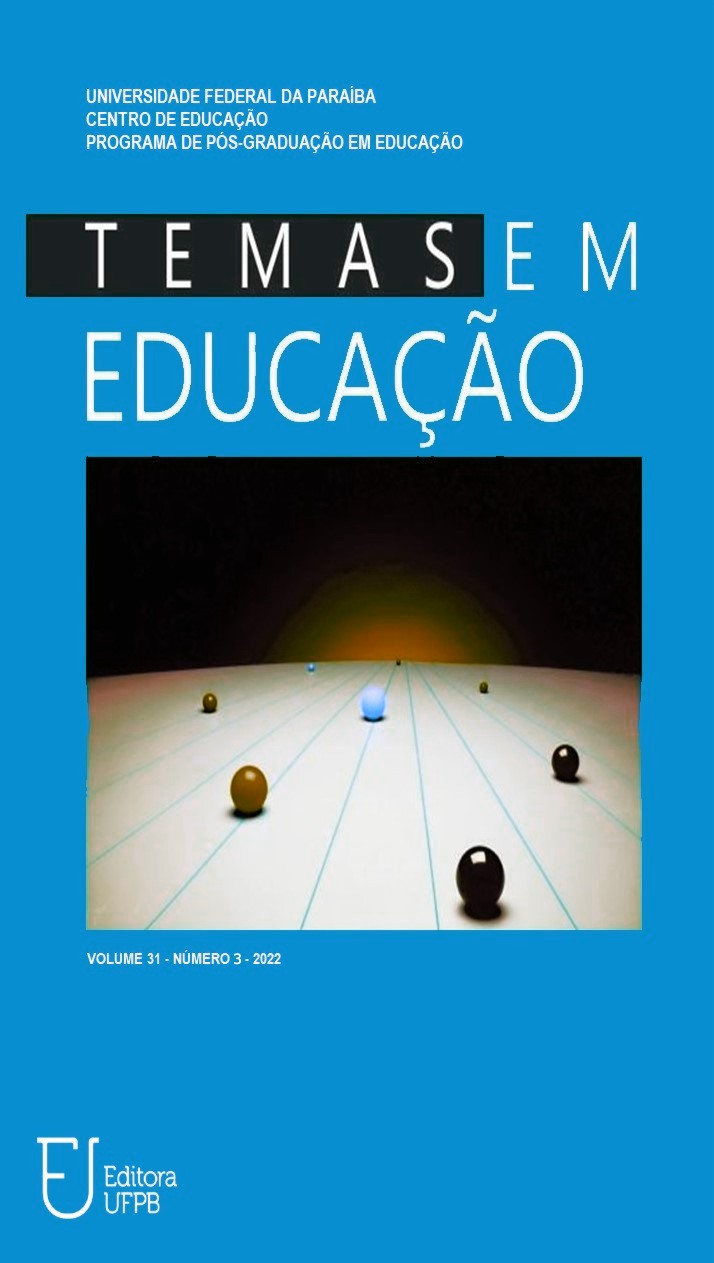Subjetividade e ludicidade no trabalho com filmes na Educação Infantil
DOI:
https://doi.org/10.22478/ufpb.2359-7003.2022v31n3.63923Keywords:
Early childhood education. Subjectivity. Playfulness. Cinema. FilmsAbstract
ABSTRACT
The article makes a theoretical reflection on how films when shown in early childhood education can subjectively influence ways of being, thinking, contributing to human, cultural and aesthetic formation already in early childhood education. We believe that, on the part of the teachers, there is a perspective of building other senses, training the receiver-child, a more panoramic view of the world, tuning it to its time, space and new senses of reality. This task must be intentional, planned and systematized with the learning processes. Methodologically, this text is anchored in Rivoltella (2005), cinema as a device of meanings; Duarte (2002), Bergala (2008), cinema as a social practice since childhood; Fantin (2007), Deheinzelin (1995), cultural formation and creativity; Alberoni (2009), playfulness; and Aumont, (2012), the subjectivity present in early childhood education and in the processes that cinema causes. It is concluded, therefore, that both the subjectivity and the ludicity implicit in children's films can bring students new ways of learning, since the insertion of children's films in education, for the most part, is confined to the place of pastime, leisure, entertainment. The subjectivity implicit in films for children and its relationship with playfulness offer perspectives for acquiring cultural content and ideas such as values, respect, empathy, among other learning experiences.
Keywords: Early childhood education. Subjectivity. Playfulness. Cinema. Films.
Downloads
References
ALBERONI, Luciene Poiares. Infância e imagens nas transformações contemporâneas da subjetividade: o que a escola tem a ver com isso? Disponível em: http://www.lab-eduimagem.pro.br/frames/seminarios/pdf/e2lucalb.pdf. Acesso em: 10 fev. 2009.
ADORNO, Theodor. W. Indústria cultural e sociedade. 4. ed. São Paulo: Paz e Terra, 2007.
AUMONT, Jacques. A Estética do Filme. Campinas: Papirus Editora, 2012.
BERGALA, Alain. A hipótese-cinema: pequeno tratado de transmissão do cinema dentro e fora da escola. Trad. Mônica Costa Netto e Silvia pimenta. Rio de janeiro: Booklin; CINEAD-LISE-FE/UFRJ, 2008. (Coleção cinema e Educação).
DEHEINZELIN, Monique. Construtivismo, a poética das transformações. São Paulo: Ática, 1996.
DUARTE, Rosália. Cinema e Educação. Belo Horizonte: Autêntica, 2002.
CASTORIADIS, Cornelius. A criação histórica. Porto Alegre: Artes e Ofícios, 1992.
FANTIN, Mônica. Mídia-Educação e cinema na Escola. Revista Teias, v. 8, n. 14-15, out. 2007. Disponível em: https://www.e-publicacoes.uerj.br/index.php/revistateias/article/view/24008. Acesso em: 07 dez. 2021.
FANTIN, Mônica. Crianças, Cinema e Educação: além do arco-íris. São Paulo: Annablume, 2011.
FREIRE, João Batista. Educação de corpo inteiro: teoria e prática da Educação Física. São Paulo: Scipione, 1997.
GIROUX, Henry A. Atos impuros: a prática política dos estudos culturais. Porto Alegre: Artmed, 2003.
HERNÁNDEZ, Fernando. Catadores da cultura visual - proposta para uma nova narrativa educacional. Tradução por Ana Death Duarte. Porto Alegre: Mediação, 2007. (Educação e Arte, 7).
KISHIMOTO Tisuko Morchida. O Jogo e a Educação Infantil. São Paulo: Editora Pioneira, 2003.
MACIEL, Aníbal de Menezes. A importância da imagem no cenário da contemporaneidade: uma necessidade da educação do olhar. Revista Temas em Educação, João Pessoa, v. 22, n. 1, p. 95-109, jan.-jun. 2013. Disponível em: https://periodicos.ufpb.br/index.php/rteo/article/view/17537/10059. Acesso em 07 dez. 2021.
MARTIN-BARBERO, Jésus. Os exercícios do ver: hegemonia audiovisual e ficção televisiva. São Paulo: SENAC, 2001.
MORENO, Gilmara Lupion. Organização do trabalho pedagógico na instituição de educação infantil. In: PASCHOAL, Jaqueline Delgado (org.). Trabalho pedagógico na educação infantil. Londrina: Humanidades, 2007.
NAPOLITANO, Marcos. Como usar o cinema na sala de aula. 2. ed. São Paulo: Contexto, 2005.
RANCIÉRE, Jacques. O expectador emancipado. Tradução: Daniele Ávila. Programa de Pós-Graduação em Teatro/UDESC. Disponível em: http://www.ceart.udesc.br/ppgt/urdimento/2010/Urdimento_15.pdf. Acesso em: 20 set. 2013.
Downloads
Published
How to Cite
Issue
Section
License
Copyright (c) 2022 Revista Temas em Educação

This work is licensed under a Creative Commons Attribution 4.0 International License.
Authors who publish in this journal agree to the following terms:
. Authors retain the copyright and grant the journal the right to first publication, with the work simultaneously licensed under the Licença Creative Commons Attribution that allows the sharing of the work with acknowledgment of authorship and initial publication in this magazine. . Authors are authorized to assume additional contracts separately, for non-exclusive distribution of the version of the work published in this journal (eg, publishing in institutional repository or as a book chapter), with acknowledgment of authorship and initial publication in this journal.
. Authors are permitted and encouraged to publish and distribute their work online (eg in institutional repositories or on their personal page) at any point before or during the editorial process, as this can generate productive changes, as well as increase impact and citation of the published work (See O Efeito do Acesso Livre).



















